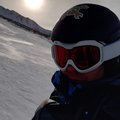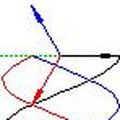 Welcome to the Hack Chat everyone, let's get started. I'm Dan, I'll be modding today along with Dusan (I think) as we welcome Nick Rehm to talk about Aerial Robotics.
Welcome to the Hack Chat everyone, let's get started. I'm Dan, I'll be modding today along with Dusan (I think) as we welcome Nick Rehm to talk about Aerial Robotics.
 Hi Dan!
Hi Dan!
 Hey everybody, can you hear me?
Hey everybody, can you hear me?
 Welcome everyone!
Welcome everyone!
 No but we can see you :)
No but we can see you :)

 Hi Nick, thanks for coming on today. can you start us off with a little about yourself?
Hi Nick, thanks for coming on today. can you start us off with a little about yourself?
![]() nothing to hear, but I can read you
nothing to hear, but I can read you
 +1
+1
 Sure Dan
Sure Dan
 I've been into radio control aircraft for about 14 years, so it was really fun to see the drone revolution happen in front of my eyes growing up. Graduated from University of Maryland in 2019 with BS in aero engineering, then went on to masters of aero/rotorcraft with a focus in aerial robotics/dynamics/control
I've been into radio control aircraft for about 14 years, so it was really fun to see the drone revolution happen in front of my eyes growing up. Graduated from University of Maryland in 2019 with BS in aero engineering, then went on to masters of aero/rotorcraft with a focus in aerial robotics/dynamics/control
 My favorite era of aerial robots / done was the multi-wii flight controller days where I had to convince my mom that I needed to tear apart the wii controller to build a drone
My favorite era of aerial robots / done was the multi-wii flight controller days where I had to convince my mom that I needed to tear apart the wii controller to build a drone
 Heh, I screwed around with that briefly
Heh, I screwed around with that briefly
 Did she buy it?
Did she buy it?
 It finally clicked for her when she saw a wooden tricopter floating around the front yard haha
It finally clicked for her when she saw a wooden tricopter floating around the front yard haha
 Lulz
Lulz
 Better to ask forgiveness than seek permission, right?
Better to ask forgiveness than seek permission, right?
 was the wii controller used to control the drone, or in the drone out of interest
was the wii controller used to control the drone, or in the drone out of interest
 With an accompanying triumphant scream of "IT'S ALIIIiiiiiive!", I presume?
With an accompanying triumphant scream of "IT'S ALIIIiiiiiive!", I presume?
 I think my parents loved the idea of RC because it kept me both in my room and away from video games
I think my parents loved the idea of RC because it kept me both in my room and away from video games
 @Nick Rehm Was your masters at University of Maryland? (College Park years were some of the best)
@Nick Rehm Was your masters at University of Maryland? (College Park years were some of the best)
 We used the IMU from the wii motion plus back before IMUs were cheap as heck
We used the IMU from the wii motion plus back before IMUs were cheap as heck
 cool :)
cool :)
![]() nice hack
nice hack
 @Nick Rehm do you mind saying where you work?
@Nick Rehm do you mind saying where you work?
 Ahh yes, masters from maryland as well--I went straight from BS to my MS program because I was already well acquainted with the rotorcraft center team
Ahh yes, masters from maryland as well--I went straight from BS to my MS program because I was already well acquainted with the rotorcraft center team
 I'm at JHU APL working as an aero engineer
I'm at JHU APL working as an aero engineer
 I'll leave it at that, but obviously there is some overlap in hobby/job skills
I'll leave it at that, but obviously there is some overlap in hobby/job skills
 @Nick Rehm awesome
@Nick Rehm awesome
 Could you tell us which kind of projects you have worked on
Could you tell us which kind of projects you have worked on
 ?
?
![]() @Nick Rehm What do you think about the optimization of aircrafts for VTOL/fixed wing UAV ?
@Nick Rehm What do you think about the optimization of aircrafts for VTOL/fixed wing UAV ?
 Sure, one project I have out there is an open-source flight controller which I use on every single flying thing I make: https://github.com/nickrehm/dRehmFlight
Sure, one project I have out there is an open-source flight controller which I use on every single flying thing I make: https://github.com/nickrehm/dRehmFlight
![]() good stuff
good stuff
 It is meant as a teaching tool for people who aren't too familiar with software dev
It is meant as a teaching tool for people who aren't too familiar with software dev

 @pascal.fust I think optimization is extremely hard until the system constraints are defined really really well. For example, "we need a vtol that can fly for a long time".... Can that vtol transition and fly on a wing? Are there loitering constraints? Funny enough most problems not involving the need for a loitering camera can be solved with a regular fixed wing
@pascal.fust I think optimization is extremely hard until the system constraints are defined really really well. For example, "we need a vtol that can fly for a long time".... Can that vtol transition and fly on a wing? Are there loitering constraints? Funny enough most problems not involving the need for a loitering camera can be solved with a regular fixed wing
 @Nick Rehm I mean, in that formulation if you can circle small enough you can call it "loitering" I think?
@Nick Rehm I mean, in that formulation if you can circle small enough you can call it "loitering" I think?
 @Yohan Hadji I think the big challenge always has been and will continue to be onboard state estimation. It's getting better with better sensors and lighter computing, but still not at the level of motion cap facilities
@Yohan Hadji I think the big challenge always has been and will continue to be onboard state estimation. It's getting better with better sensors and lighter computing, but still not at the level of motion cap facilities
![]() I agree. But, I can also observe that most VTOL aircrafts out there still don't benefit of the fact, that takeoff/landing low speed lift capabilities are not required
I agree. But, I can also observe that most VTOL aircrafts out there still don't benefit of the fact, that takeoff/landing low speed lift capabilities are not required
 @Nick Rehm sorry, "state estimation"?
@Nick Rehm sorry, "state estimation"?
 VTOL solely for takeoff/landing is definitely desirable when runway space is limited
VTOL solely for takeoff/landing is definitely desirable when runway space is limited
 @Joe Stavitsky state estimation meaning measurement of a drone's orientation/position/motion in space relative to the world
@Joe Stavitsky state estimation meaning measurement of a drone's orientation/position/motion in space relative to the world
 @Nick Rehm interesting. It never struck me as a major problem but googling now it seems I was very wrong.
@Nick Rehm interesting. It never struck me as a major problem but googling now it seems I was very wrong.
 Do you think there is still room for small companies in the UAV space?
Do you think there is still room for small companies in the UAV space?
 I would say state estimation is 95% of the problem of deploying any sort of autonomy in a real-world environment. You may have seen those awesome autonomous drone aerobatics demos--looks closely. All of the state estimation is happening via motion capture cameras
I would say state estimation is 95% of the problem of deploying any sort of autonomy in a real-world environment. You may have seen those awesome autonomous drone aerobatics demos--looks closely. All of the state estimation is happening via motion capture cameras
![]() My point was, that in case the operation requires VTOL transitioning capabilities, aircraft design should take advantage of it, but rarely does
My point was, that in case the operation requires VTOL transitioning capabilities, aircraft design should take advantage of it, but rarely does
 Have you looked into controlling multiple drones, for things like lighting displays, that looks like it'd be very complex, but looks v. impressive
Have you looked into controlling multiple drones, for things like lighting displays, that looks like it'd be very complex, but looks v. impressive
![]() ....i.e., why should an aircraft be able to fly at low air speeds when it has VTOL units?
....i.e., why should an aircraft be able to fly at low air speeds when it has VTOL units?
 @pascal.fust ahhh, very true.
@pascal.fust ahhh, very true.
 @Nick Rehm One thing that fascinated me was the choreographed big networks of tiny drones. If you've seen those, would you say the state estimation problem is more or less difficult for them?
@Nick Rehm One thing that fascinated me was the choreographed big networks of tiny drones. If you've seen those, would you say the state estimation problem is more or less difficult for them?
 @anfractuosity definitely looked into it, but gets expensive fast between a ground station, distributed telemetry equipment, and then all of the vehicles lol
@anfractuosity definitely looked into it, but gets expensive fast between a ground station, distributed telemetry equipment, and then all of the vehicles lol
 Why hasn't a partially buoyant either He or H2 assisted drone become a useful means to extend flight time with the reduced power requirements?
Why hasn't a partially buoyant either He or H2 assisted drone become a useful means to extend flight time with the reduced power requirements?
 To my knowledge drone shows like that are using a combination of RTK-GPS which is a really good state estimate on its own, as well as ground-based sensors to further correct GPS drift
To my knowledge drone shows like that are using a combination of RTK-GPS which is a really good state estimate on its own, as well as ground-based sensors to further correct GPS drift
 I could be wrong
I could be wrong
![]() @kjansky1 most probably because you would need a good volume which results in extended drag
@kjansky1 most probably because you would need a good volume which results in extended drag
 @Joe Stavitsky Any measurements that help you know what is happening. Velocity, acceleration, rotation, rotation rate, vibrational FFTs. Voltages, currents, battery and fuel capacity, temperature, density, clear air turbulence. Lots of sensors available, and thousands more in development, in thousands of labs. But a mess, expensive and everyone for themselves.
@Joe Stavitsky Any measurements that help you know what is happening. Velocity, acceleration, rotation, rotation rate, vibrational FFTs. Voltages, currents, battery and fuel capacity, temperature, density, clear air turbulence. Lots of sensors available, and thousands more in development, in thousands of labs. But a mess, expensive and everyone for themselves.
@kjansky1 There are stationary airships proposed for months and years long "low orbit" satellites.
 @kjansky1 wind :)
@kjansky1 wind :)
 @Nick Rehm not sure if we're talking about the same thing, I meant the really tiny ones. Let me see if I can find video.
@Nick Rehm not sure if we're talking about the same thing, I meant the really tiny ones. Let me see if I can find video.
 Above 100,000 feet. But if you can make big ones, then tiny ones are possible too. You have to decide what things you like making, and who you want to work with.
Above 100,000 feet. But if you can make big ones, then tiny ones are possible too. You have to decide what things you like making, and who you want to work with.
![]() @Nick Rehm Which system of aircraft control (autopilot,etc.) would you see as most promising for future developments?
@Nick Rehm Which system of aircraft control (autopilot,etc.) would you see as most promising for future developments?
 Not exactly it, but close enough
Not exactly it, but close enough

https://www.youtube.com/watch?v=hj_SBSpK5qg
 @pascal.fust I'm not sure I follow, could you elaborate? Like what general components need more work, or what existing packages show promise?
@pascal.fust I'm not sure I follow, could you elaborate? Like what general components need more work, or what existing packages show promise?
 If only partially buoyant and streamlined drag would be insignificant if only low speeds but increased loitering time would be the requirement. Wind is not a factor because the drone is still powered. Goodyear is fully buoyant and it has no problem in maneuvering.
If only partially buoyant and streamlined drag would be insignificant if only low speeds but increased loitering time would be the requirement. Wind is not a factor because the drone is still powered. Goodyear is fully buoyant and it has no problem in maneuvering.
 @Joe Stavitsky Something like that is probably doing very simple position estimation using an optical flow camera
@Joe Stavitsky Something like that is probably doing very simple position estimation using an optical flow camera
![]() looking at open source solutions, would you think that ardupilot, pixhawk, etc. are most promising for future developments?
looking at open source solutions, would you think that ardupilot, pixhawk, etc. are most promising for future developments?
 @Nick Rehm I've seen other projects where they are much more carefully choreographed, like in a square grid that undulates vertically
@Nick Rehm I've seen other projects where they are much more carefully choreographed, like in a square grid that undulates vertically
![]() Or do you see more elaborated systems at the horizon?
Or do you see more elaborated systems at the horizon?
 @Joe Stavitsky Look for the motion capture cameras!
@Joe Stavitsky Look for the motion capture cameras!
 @Nick Rehm so you mean outboard right?
@Nick Rehm so you mean outboard right?
 ardupilot/px4 are here to stay as the 'standard' I think
ardupilot/px4 are here to stay as the 'standard' I think
![]() okay, thanks, a word of a professional
okay, thanks, a word of a professional
![]() Random thought. 3d-scan the environment, use that as a fixed reference, and motion-cap camera on the drone itself.
Random thought. 3d-scan the environment, use that as a fixed reference, and motion-cap camera on the drone itself.
 But skynode is one of the first attempts to integrate more computing directly olongside the autopilot for more autonomy: https://auterion.com/drone-manufacturers/skynode/ So definitely something to watch out for in the near future
But skynode is one of the first attempts to integrate more computing directly olongside the autopilot for more autonomy: https://auterion.com/drone-manufacturers/skynode/ So definitely something to watch out for in the near future
 @Thomas Shaddack SLAM - simultaneous localization and mapping is basically doing this, using computer vision to build a live map of the environment and estimate the robots position within
@Thomas Shaddack SLAM - simultaneous localization and mapping is basically doing this, using computer vision to build a live map of the environment and estimate the robots position within
 I love this thing. The company also did a bird.
I love this thing. The company also did a bird.

https://www.youtube.com/watch?v=nj1yhz5io20
 They do industrial manufacturing robots, mostly
They do industrial manufacturing robots, mostly
 I've been dying to make a hovering ornithopter
I've been dying to make a hovering ornithopter
 @Nick Rehm I wanted to copy it, but they're cheap on specifics :(
@Nick Rehm I wanted to copy it, but they're cheap on specifics :(
 how about a cyclocopter?
how about a cyclocopter?
 @Nick Rehm there's a whitepaper, if you want the link
@Nick Rehm there's a whitepaper, if you want the link
 oh yes that'd be awesome if you could share
oh yes that'd be awesome if you could share
 @Nick Rehm my mistake, a brochure https://www.festo.com/us/en/e/about-festo/research-and-development/bionic-learning-network/highlights-from-2013-to-2014/bionicopter-id_33493/
@Nick Rehm my mistake, a brochure https://www.festo.com/us/en/e/about-festo/research-and-development/bionic-learning-network/highlights-from-2013-to-2014/bionicopter-id_33493/
 on the topic of robot dragonflies, here's a little video snippet from some research I did in undergrad:
on the topic of robot dragonflies, here's a little video snippet from some research I did in undergrad:
 About 275 million years ago dragonflies had a wingspan close to 30 in. or 2.5 ft (75 cm) with an estimated weight of over 1 pound (450 g), which is similar to the size and weight of a crow. Build that with robotics!
About 275 million years ago dragonflies had a wingspan close to 30 in. or 2.5 ft (75 cm) with an estimated weight of over 1 pound (450 g), which is similar to the size and weight of a crow. Build that with robotics!
 Had a natural ornithopter (hummingbird) buzz me the other day. Just hovered by my face for a few seconds before figuring out I wasn't food and flying off. An amazing design -- if we could only pack that much tech into such a small package.
Had a natural ornithopter (hummingbird) buzz me the other day. Just hovered by my face for a few seconds before figuring out I wasn't food and flying off. An amazing design -- if we could only pack that much tech into such a small package.

https://www.youtube.com/watch?v=qQAatJg3tnc
 Do you do any work on GPS-denied environments?
Do you do any work on GPS-denied environments?
 (Of course as soon as I hit enter, I realize anyone doing such work probably can't talk about it if so...)
(Of course as soon as I hit enter, I realize anyone doing such work probably can't talk about it if so...)
 @myself lol, yes I do and it is actually one of my main interests. For some reason, I just hate GPS even though it works for 95% of drone applications
@myself lol, yes I do and it is actually one of my main interests. For some reason, I just hate GPS even though it works for 95% of drone applications

https://www.youtube.com/watch?v=p8frNNYQNV4
 GPS-denied motion planning ^^^
GPS-denied motion planning ^^^
 Oooo, that's open in a tab for later! Very exciting.
Oooo, that's open in a tab for later! Very exciting.
 @Nick Rehm so once I get my 3d printer back I'd like to start work on propeller design, can you recommend any texts?
@Nick Rehm so once I get my 3d printer back I'd like to start work on propeller design, can you recommend any texts?
 Gordan Leishman's heli aero book is basically the bible of rotor design
Gordan Leishman's heli aero book is basically the bible of rotor design
 I keep feeling like powerlines are one of the hardest obstacles to avoid; trees tend to show up on lidar a lot more reliably. How is that dealt with in the real world?
I keep feeling like powerlines are one of the hardest obstacles to avoid; trees tend to show up on lidar a lot more reliably. How is that dealt with in the real world?
![]() @Joe Stavitsky Do you think that 3D printed structures are strong enough for props?
@Joe Stavitsky Do you think that 3D printed structures are strong enough for props?
 @Nick Rehm and what about software?
@Nick Rehm and what about software?
![]() resin printers, SLA, could be strong enough.
resin printers, SLA, could be strong enough.
 That is definitely a very real problem. Detecting powerline-like things is very hard. Maybe somewhere that AI/computer vision will fill in in the next few years?
That is definitely a very real problem. Detecting powerline-like things is very hard. Maybe somewhere that AI/computer vision will fill in in the next few years?
![]() @Thomas Shaddack Depends on the resin material?
@Thomas Shaddack Depends on the resin material?
 Dan Maloney
Dan Maloney
Discussions
Become a Hackaday.io Member
Create an account to leave a comment. Already have an account? Log In.